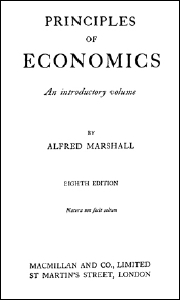
Alfred Marshall (1842-1924) produced an economics textbook, Principles of Economics, that in many ways would be recognizable to students of mainstream microeconomics today. He was immensely influential, partly because of his prolific writing, but also because of his creation of a strong legacy. In 1888, Herbert Foxwell wrote, “Half the economic chairs in the United Kingdom are occupied by [Marshall’s] pupils, and the share taken by them in general economic instruction in England is even larger than this.” (Ekelund and Hebert, A History of Economic Theory and Method, 5th ed., p. 345).
Though Marshall was a mathematician before he became an economist, and used mathematics in economics (early in life he translated Ricardo and Mill into mathematics), he recognized that mathematics had its limits. In 1906, he wrote to a friend, Arthur Bowley:
I had a growing feeling in the later years of my work at the subject that a good mathematical theorem dealing with economic hypotheses was very unlikely to be good economics: and I went more and more on the rules–(1) Use mathematics as a shorthand language, rather than as an engine of inquiry. (2) Keep to them till you have done. (3) Translate into English. (4) Then illustrate by examples that are important in real life. (5) Burn the mathematics. (6) If you can’t succeed in 4, burn 3. This last I did often.
Alfred Marshall, quoted in Ekelund and Hebert, 5th ed., p. 346.
Austrian economist Carl Menger (1840–1921) likewise urged caution in the use of mathematics. Rather than using abstractions to describe purposeful human action, Menger’s “empirical analysis involves the systematic construction of a causal theory based on observation of basic empirical phenomena such as human wants, stocks of goods, technical knowledge, and so on.” (Peter Klein, 2007) Menger’s empiricism was compatible with Murray Rothbard‘s view “that the fundamental axiom and subsidiary axioms are derived from the experience of reality and are therefore in the broadest sense empirical.” (Rothbard, Economic Controversies, ch. 4) Departing from reality was a road to economic perdition. According to Menger,
A researcher who arrives by the way of analysis at such elements that do not correspond to reality or who, without any true analysis, takes his departure from arbitrary axioms–which is only too often the case with the so-called rational method–falls necessarily into error, even if he makes superior use of mathematics.
Menger, Letter to León Walras, 1884
Even John Maynard Keynes, whose theories engendered mathematized macroeconomics for countless economics students over the last century, had concerns:
Too large a proportion of recent “mathematical” economics are mere concoctions, as imprecise as the initial assumptions they rest on, which allow the author to lose sight of the complexities and interdependencies of the real world in a maze of pretentious and unhelpful symbols.
John Maynard Keynes, The General Theory of Employment, Interest, and Money, 1936, pp. 297–98
Despite superficially similar sentiments of a general nature on the use of math, Austrian economists would suggest that Marshall nevertheless committed some methodological errors that led him and his neoclassical followers into serious problems. Among these was his belief that the methods of the natural sciences could be applied to economics. An extended quotation here from Friedrich Hayek will make the point:
The position of man… brings it about that the essential basic facts which we need for the explanation of social phenomena are part of common experience, part of the stuff of our thinking. In the social sciences it is the elements of the complex phenomena which are known beyond the possibility of dispute. In the natural sciences they can only be at best surmised. The existence of these elements is so much more certain than any regularities in the complex phenomena to which they give rise, that it is they which constitute the truly empirical factor in the social sciences. There can be little doubt that it is this different position of the empirical factor in the process of reasoning in the two groups of disciplines which is at the root of much of the confusion with regard to their logical character. The essential difference is that in the natural sciences the process of deduction has to start from some hypothesis which is the result of inductive generalizations, while in the social sciences it starts directly from known empirical elements and uses them to find the regularities in the complex phenomena which direct observations cannot establish. They are, so to speak, empirically deductive sciences, proceeding from the known elements to the regularities in the complex phenomena which cannot be directly established.
Friedrich A. Hayek, “The Nature and History of the Problem,” in Collectivist Economic Planning, 1935, p. 11.
Today, Marshall’s hesitancy to use mathematics as an “engine of inquiry” has been forgotten among mainstream economists, and frequently, economists have put the mathematical cart before the human action horse. Austrian economists have not forgotten the warnings from Menger, Rothbard, and others in their intellectual tradition, but some, like Marek Hudik, have argued that Austrian economics could benefit from the judicious use of mathematics.
